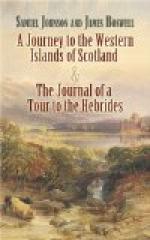Their corn grounds often lie in such intricacies among the craggs, that there is no room for the action of a team and plow. The soil is then turned up by manual labour, with an instrument called a crooked spade, of a form and weight which to me appeared very incommodious, and would perhaps be soon improved in a country where workmen could be easily found and easily paid. It has a narrow blade of iron fixed to a long and heavy piece of wood, which must have, about a foot and a half above the iron, a knee or flexure with the angle downwards. When the farmer encounters a stone which is the great impediment of his operations, he drives the blade under it, and bringing the knee or angle to the ground, has in the long handle a very forcible lever.
According to the different mode of tillage, farms are distinguished into long land and short land. Long land is that which affords room for a plow, and short land is turned up by the spade.
The grain which they commit to the furrows thus tediously formed, is either oats or barley. They do not sow barley without very copious manure, and then they expect from it ten for one, an increase equal to that of better countries; but the culture is so operose that they content themselves commonly with oats; and who can relate without compassion, that after all their diligence they are to expect only a triple increase? It is in vain to hope for plenty, when a third part of the harvest must be reserved for seed.
When their grain is arrived at the state which they must consider as ripeness, they do not cut, but pull the barley: to the oats they apply the sickle. Wheel carriages they have none, but make a frame of timber, which is drawn by one horse with the two points behind pressing on the ground. On this they sometimes drag home their sheaves, but often convey them home in a kind of open panier, or frame of sticks upon the horse’s back.
Of that which is obtained with so much difficulty, nothing surely ought to be wasted; yet their method of clearing their oats from the husk is by parching them in the straw. Thus with the genuine improvidence of savages, they destroy that fodder for want of which their cattle may perish. From this practice they have two petty conveniences. They dry the grain so that it is easily reduced to meal, and they escape the theft of the thresher. The taste contracted from the fire by the oats, as by every other scorched substance, use must long ago have made grateful. The oats that are not parched must be dried in a kiln.
The barns of Sky I never saw. That which Macleod of Raasay had erected near his house was so contrived, because the harvest is seldom brought home dry, as by perpetual perflation to prevent the mow from heating.
Of their gardens I can judge only from their tables. I did not observe that the common greens were wanting, and suppose, that by choosing an advantageous exposition, they can raise all the more hardy esculent plants. Of vegetable fragrance or beauty they are not yet studious. Few vows are made to Flora in the Hebrides.




